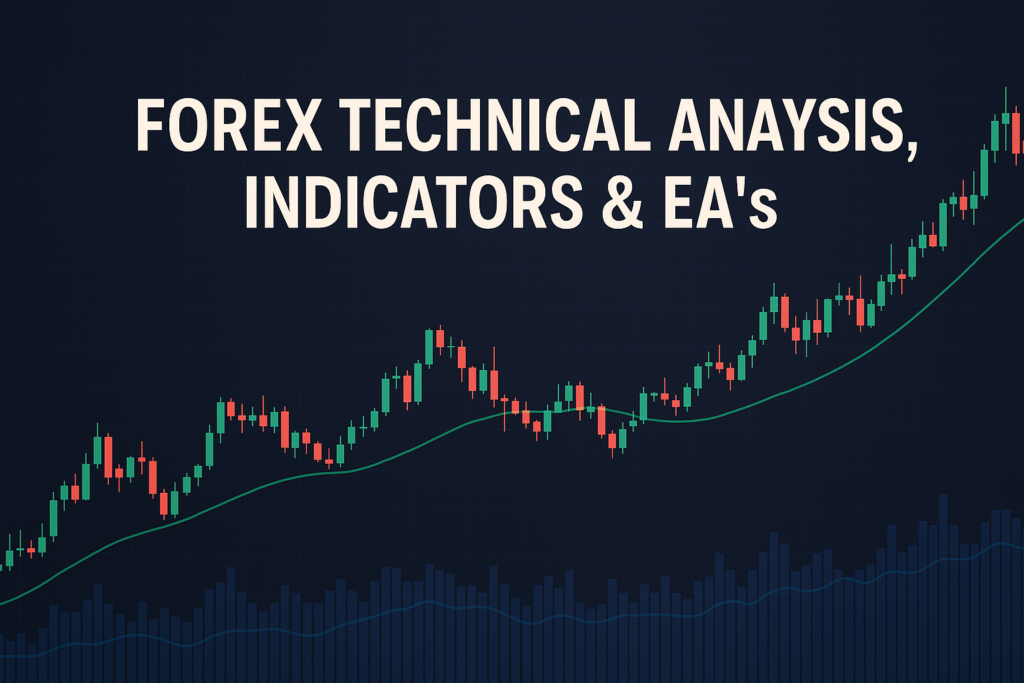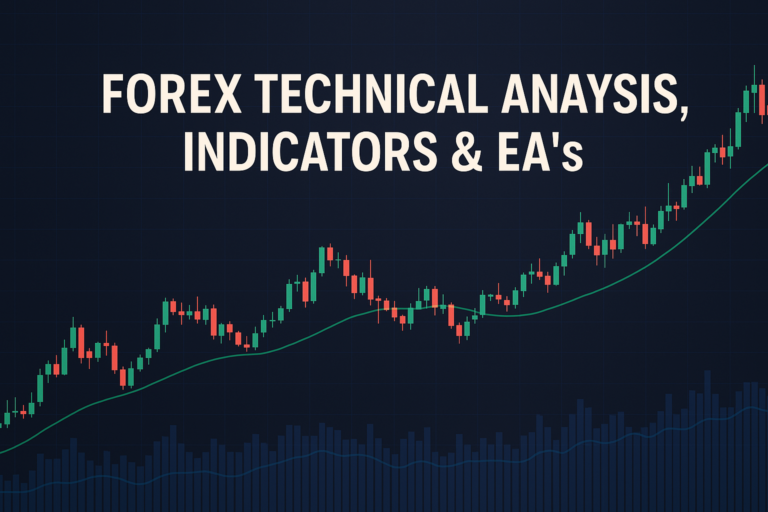
ATR chart indicator helps traders gauge market volatility, making it essential for successful Forex trading strategies.
The ATR chart indicator, or Average True Range, is a tool that traders use in Forex to measure market volatility. It helps visualize how much a currency pair moves, giving insights into potential price swings. Understanding this indicator is crucial, especially for those who want to navigate the Forex world effectively.
Many traders, both beginners and seasoned professionals, often struggle to grasp the full potential of the ATR chart indicator. Some find it confusing, while others overlook its importance. However, understanding and applying this tool can lead to better trading decisions and increased profitability.
This article will guide you through the ATR chart indicator’s basics, its history, advantages and disadvantages, how to apply it, and effective trading strategies. You’ll see how mastering this indicator can elevate your trading skills.
Trading isn’t just about profits; it’s also about understanding costs. One common issue traders face are Hidden Fees in Trading, which can sneak up on you and reduce your earnings.
What is an ATR Chart Indicator?
The ATR chart indicator measures market volatility. Think of it as a tool that tells you how much a currency pair moves on average over a certain period. For instance, if the ATR value is high, it means the currency is experiencing big price changes. Conversely, a low ATR value indicates that the currency pair is relatively stable. This helps traders decide whether to enter or exit trades based on the market conditions.
Types of ATR Chart Indicator
There are different types of ATR chart indicators, including:
- Simple ATR: This is the most common type. It calculates the average price range over a specified period.
- Exponential ATR: This type gives more weight to recent price movements, making it more responsive.
- Weighted ATR: Similar to the exponential, but it uses a different method to weigh the price movements.
How ATR Chart Indicator Smooths Out Price Action
The ATR chart indicator smooths out price action by averaging the true range over a set period. This means it helps traders see through the noise of price spikes or drops. For example, if there’s a sudden market event causing a spike, the ATR will help show the overall trend, making it easier for traders to make informed decisions.
Common Periods Used and Why
Traders commonly use ATR periods of 14, 20, or even 30 days. The 14-day period is popular because it balances short-term and long-term volatility. If you’re a day trader, you might prefer shorter periods, like 5 or 10 days, to capture quick price movements. Choosing the right period helps you align the ATR with your trading strategy.
The History of ATR Chart Indicator: How It Became Popular
Origin of ATR Chart Indicator
The ATR chart indicator was created by J. Welles Wilder in 1978. He introduced it in his book, “New Concepts in Technical Trading Systems.” Wilder aimed to provide traders with a better way to measure volatility, which was often overlooked. His work laid the foundation for many indicators used today.
When Did Traders Start Using It Widely?
After its introduction, the ATR gained popularity throughout the 1980s and 1990s as more traders recognized its value. With the rise of technical analysis, many began to incorporate the ATR into their trading strategies. Today, it’s a staple in Forex trading, helping thousands of traders every day.
Real-Life Stories
Many professional traders credit the ATR chart indicator for their success. For example, one trader used the ATR to identify a volatile market, allowing him to take advantage of significant price swings. By employing this indicator, he was able to increase his profitability during uncertain times, demonstrating its power in real-world trading.
Advantages and Disadvantages of ATR Chart Indicator
Advantages:
The ATR chart indicator offers several benefits:
- Helps identify trends easily: A rising ATR indicates increasing volatility, signaling potential trends.
- Useful for dynamic support and resistance: Traders can use ATR to set stop-loss orders effectively.
- Works well for crossover strategies: ATR can be combined with moving averages to confirm trading signals.
Disadvantages:
However, it’s not without its drawbacks:
- Lags behind price movements: ATR may not react immediately to sudden price changes, leading to missed opportunities.
- Can give false signals in sideways markets: In calm markets, ATR may suggest volatility that isn’t present, leading to confusion.
How to Apply ATR Chart Indicator on MT4 & MT5
Step-by-Step Guide to Adding ATR Chart Indicator on Charts
To add the ATR chart indicator on MT4 or MT5, follow these simple steps:
- Open your trading platform.
- Click on “Insert” from the top menu.
- Select “Indicators,” then “Trend,” and choose “Average True Range.”
- Click “OK” to apply it to your chart.
Customizing ATR Chart Indicator Settings
You can customize the ATR settings to suit your trading style. Change the period, colors, and types to make it visually appealing. For instance, if you prefer to see higher volatility, you might set a shorter period.
Saving Templates for Easy Application
Once you have the ATR set up how you like, save it as a template. This way, you can apply the same settings to future charts with just a click.
5 to 7 Trading Strategies Using Only ATR Chart Indicator
All Time Frame Strategy M5 to D1
This strategy works across all time frames. When the ATR increases, it indicates high volatility. Traders can look for breakout trades during these times, buying when the price breaks above resistance and selling when it falls below support.
Trending Strategies
In a trending market, a rising ATR supports the trend. Buy when the price is above the moving average and the ATR is increasing. Sell when the price is below the moving average with an increasing ATR.
Counter Trade Strategies
This strategy focuses on market reversals. If the ATR is low and starts to increase, it may indicate a price reversal. Traders can enter a buy position when the price crosses above previous resistance levels.
Swing Trades Strategies
Swing traders can use the ATR to take advantage of price swings. When the ATR rises after a period of low volatility, it signals potential price movement. Traders can enter a position to capitalize on the next swing.
5 to 7 Trading Strategies Combining ATR Chart Indicator with Other Indicators
All Time Frame Strategy M5 to D1
Combine the ATR with the Relative Strength Index (RSI) for a powerful strategy. When the ATR rises and RSI indicates oversold conditions, consider a buy trade. This approach takes advantage of both volatility and momentum.
Trending Strategies
Mix the ATR with moving averages. When the ATR increases and the price is above the moving average, it’s a strong buy signal. For selling, look for a rising ATR with the price below the moving average.
Counter Trade Strategies
Use the ATR with Bollinger Bands. If the ATR starts to rise while the price touches the lower Bollinger Band, it might be a good opportunity to buy. Conversely, a rise in ATR near the upper band signals a potential sale.
Swing Trade Strategies
Combine the ATR with MACD. When the ATR indicates high volatility and MACD shows a crossover, it’s a strong signal to enter a trade. This combination can lead to successful swing trades.
It’s essential to note that you might encounter issues with Custom indicators updating slowly. Fixing these issues can enhance your trading experience.
Top 10 FAQs About ATR Chart Indicator
1. What does ATR mean?
ATR stands for Average True Range, a tool measuring market volatility.
2. How do I calculate ATR?
ATR is calculated using the average of the true ranges over a specified period.
3. Why is ATR important?
ATR helps traders understand market volatility, guiding entry and exit points.
4. Can ATR be used for all currency pairs?
Yes, ATR is versatile and can be applied to any currency pair.
5. What time frame is best for ATR?
It depends on your trading style. Shorter time frames suit day traders, while longer periods benefit swing traders.
6. Does ATR give buy/sell signals?
ATR itself does not provide signals but indicates market volatility to support decision-making.
7. Can I use ATR for stock trading?
Absolutely! ATR is not limited to Forex and works well in stock trading too.
8. How often should I check ATR?
Monitor ATR regularly, especially before entering trades, to gauge current volatility.
9. Is ATR a lagging indicator?
Yes, ATR is a lagging indicator, meaning it reacts to price movements rather than predicting them.
10. How can I improve my use of ATR?
Practice using ATR in demo accounts, combine it with other indicators, and refine your strategies.
Conclusion
In summary, the ATR chart indicator is a powerful tool for traders looking to understand market volatility. By mastering how to use it effectively, you can enhance your trading strategies and make informed decisions. Remember, practice is key—test your strategies in a demo environment before risking real money.
Embrace the ATR chart indicator as part of your trading toolkit, and watch your Forex trading journey evolve!
Looking to go beyond the basics? This resource offers deeper insights Zacks, NerdWallet
Expand Your Knowledge
- 📌 Forex Trading Learning Road Map
- 📌 Forex Trading Course with no Fees
- 📌 Forex Trading Issues, Problems, and Solutions
- 📌 Forex Daily Forecast & Live Updates
- 📌 Forex Fundamental & News Analysis: Tomorrow’s Market Movers & Trade Opportunities
- 📌 Forex Education Hub: Learn & Profit
- 📌 Forex Technical Analysis, Indicators & EA’s
Start Trading Today
Ready to take your forex trading to the next level? Open an account with Exness, one of the most trusted platforms in the industry. 👉 Sign Up Now and trade with confidence!
My recommended broker stands out with ultra-low spreads for beginners, instant withdrawals, and zero spread accounts for pro traders.
Trusted since 2008, lightning-fast execution, no hidden fees, and a secure, transparent trading environment—giving you the edge you need to succeed. 🚀
Watch this helpful video to better understand atr chart indicator:
The ATR, or Average True Range, is a valuable tool for Forex traders as it measures market volatility, specifically how much the price moves on average over a set period. The most common setting for the ATR is 14 periods, which aligns well with other indicators like the RSI that also often uses a 14-period setting. This consistency can create harmony in your trading strategy, making it easier to interpret signals across different indicators. The ATR helps traders determine objective levels for placing stop-losses and target prices, which are crucial for managing risk effectively. A popular approach is to set the stop-loss at a multiplier of the ATR, commonly two times the ATR value, allowing traders to adjust their strategies based on current market conditions. By doing so, traders can better manage their risk and potential rewards, as the ATR provides a clearer understanding of the average price movements over time.
To effectively use the ATR in trading, one must first access it through the indicators tab in trading platforms like TradingView. Once opened, you can adjust the settings if necessary, though it’s often best to keep the length at the standard 14 periods for simplicity. When analyzing a specific candle on the chart, read the ATR value to determine the average price movement. For instance, if the ATR value is 0.0021, you can establish your stop-loss based on this figure. A common strategy is to set the stop-loss at two times the ATR, adjusting your risk-to-reward ratio accordingly. This method allows you to base both your stop-loss and target levels on the ATR, ensuring that your trading decisions are data-driven rather than subjective. By maintaining an objective approach to setting these levels, you can improve your trading strategy and enhance your overall performance in the Forex market.
In Forex trading, understanding currency trading hours is essential for maximizing opportunities in the market. Knowing when the different global markets are open can help you time your trades effectively, as volatility can vary significantly throughout the day.
YouTube Video Library: Related Videos
How To Understand The ATR EXPLAINED For Traders! *Average Volatility*📈 #shortst
Master The ATR Indicator (Most Useful Indicator On The PLANET!)
How to use the ATR Indicator
Atr indicator secret method 🔥
How To Place The PERFECT Stop Loss Using ATR Indicator
#forex #forextrading #forexsignala #eurusd #gbpjpy
ATR Indicator Secrets and Strategy | A Simple Powerful Forex Indicator
Note: The video above is embedded from YouTube and is the property of its original creator. We do not own or take responsibility for the content or opinions expressed in the video.


